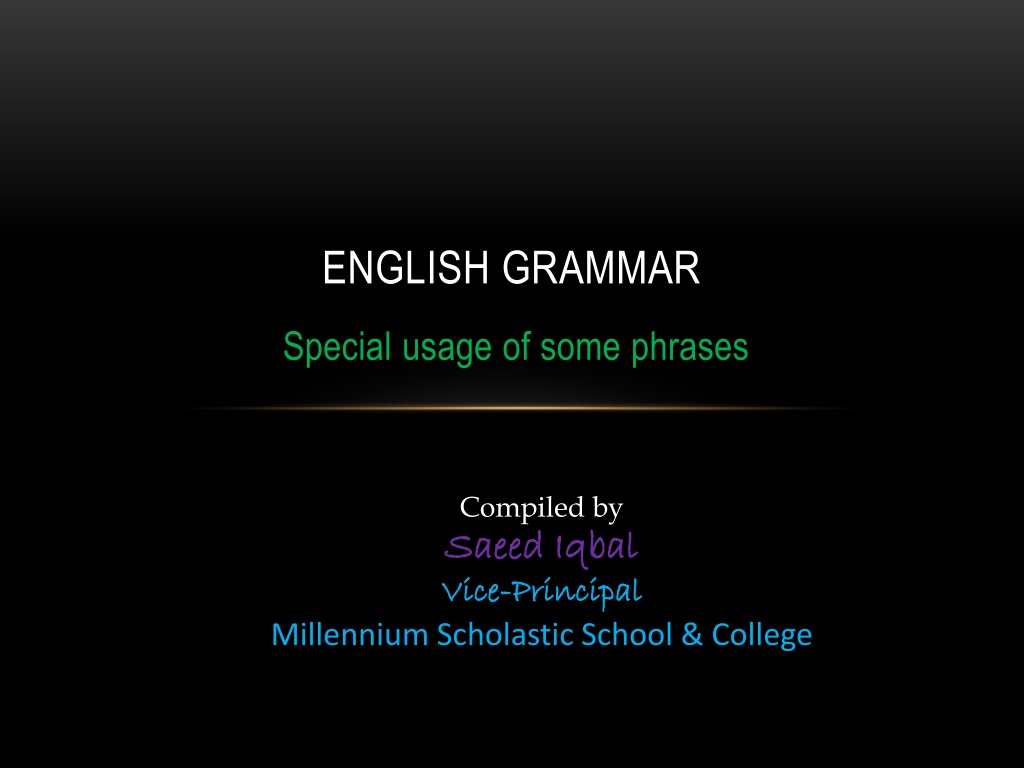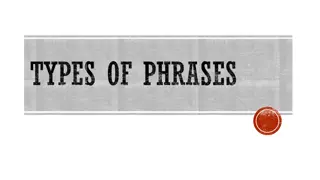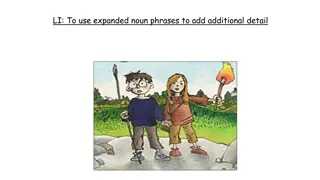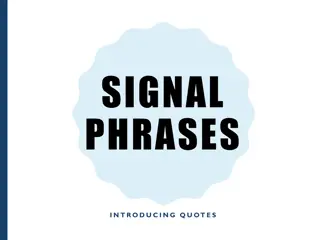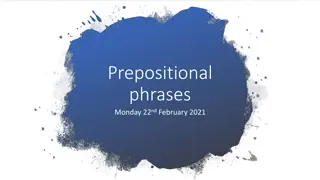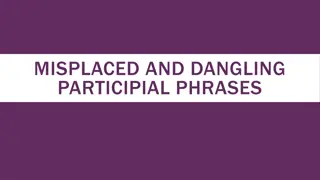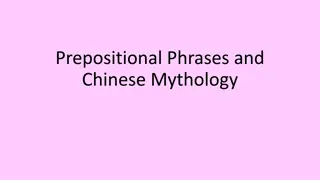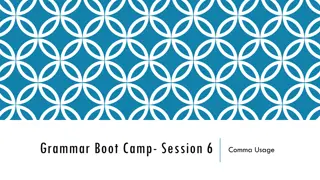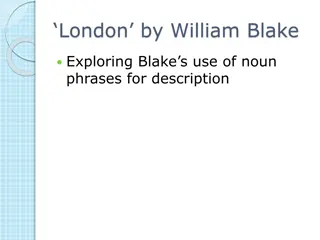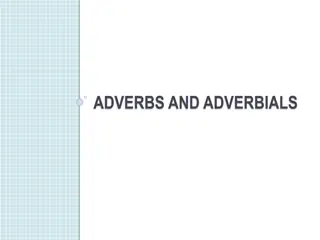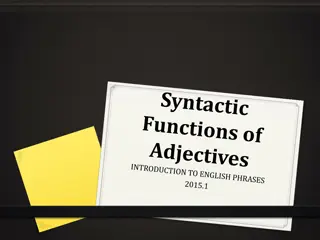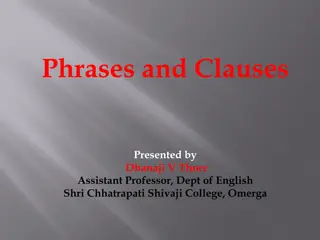Special Usage of Phrases in English Grammar Compiled by Saeed Iqbal
This compilation by Saeed Iqbal focuses on special usage phrases in English grammar, such as "as if" and "as though," explaining their meanings, tenses, and examples. It also covers the usage of "as soon as" as a conjunction, its position in a sentence, and how to use the present simple tense with it. The content provides valuable insights into these common English grammar structures.
Download Presentation

Please find below an Image/Link to download the presentation.
The content on the website is provided AS IS for your information and personal use only. It may not be sold, licensed, or shared on other websites without obtaining consent from the author. Download presentation by click this link. If you encounter any issues during the download, it is possible that the publisher has removed the file from their server.
E N D
Presentation Transcript
ENGLISH GRAMMAR Special usage of some phrases Compiled by Saeed Iqbal Saeed Iqbal Vice Vice- -Principal Principal Millennium Scholastic School & College
as if and as though be born As soon as: conjunction Weaker obligation: had better Strong obligation: have (got) to What does it look like / What s ..look let alone PHRASE Introductory It What if / suppose / supposing Introductory there would rather have (got) to and must
as if and as though 1 meaning As if and as though are both used to say what a situation seems like. They can refer to something that we think may be true. It looks as if/though it s going to rain. It sounds as if/though Jack s going to change his job. They can also be used to talk about things which we know are not true. I feel as if/though I'm dying. She was acting as if/though she was in charge.
asif and as though 2 tenses When we talk about things which we know are not true, we can use a past tense with a present meaning after as if/though. This emphasizes the meaning of unreality. Compare: - She looks as if she is rich. (Perhaps she is.) He talks as i f he was rich. (But he is definitely not.) - You look as though you know each other. Why is he looking at me as though he knew me? I've never seen him before. In a formal style, were can be used instead of was in an unreal comparison. This is common in American English. He talks as i f he were rich.
As soon as: conjunction We use as soon as to show that something happens immediately, i.e. at the very moment another action is completed , or shortly after another action is completed . I ll call you as soon as I arrive.[= I will arrive and then I ll call you immediately. ] As soon as I have the information, I ll tell you. [= I ll get the information and then I ll tell you immediately. ] As soon as I will . . . We do not use will with as soon as when speaking about the future: I m going to have a shower as soon as I will get home. He will be back tomorrow; I ll give him the message as soon as I will see him.
As soon as: conjunction Position of as soon as in a sentence As soon as comes at the beginning of a subordinate clause. We can begin our sentence with either the subordinate clause or the main clause the meaning is the same. Look at this example: As soon as we got out the car, it started raining. [subordinate clause] [main clause] It started raining as soon as we got out the car. [main clause] [subordinate clause]
As soon as: conjunction We use the present simple with as soon as when we speak about repeated actions. As soon as he wakes up, he checks his phone for messages. We use the present simple with as soon as when we speak about the future. We do not use will. I'll go to the shops as soon as it stops raining. as soon as it will stop
Weaker obligation: had better 1 meaning We use had better to give strong advice, or to tell people what to do (including ourselves). You'd better turn that music down before your dad gets angry. It s seven o'clock. I'd better put the meat in the oven. Had better refers to the immediate future. It is more urgent than should or ought. Compare: I really ought to go and see Fred one of these days. Well, you d better do itsoon - he's leaving for South Africa at the end of the month. Had better is not used in polite requests. Compare: Could you help me, if you've got time? (request) You d better help me. If you don t, there'll be trouble, (order/threat)
2 forms Had better refers to the immediate future, but the form is always past (havebetter is impossible). After had better we use the infinitive without to. It's late - you had better hurry up. ( not . . . you have better . . . or . We normally make the negative with had better not + infinitive. You d better not wake me up when you come in. (You hadn't better wakeme . . . is possible in British English but very unusual.) A negative interrogative form Hadn't. . . better. . .? is possible. Hadn't we better tell him the truth? Normal unemphatic short answer forms are as follows: Shall I put my shoes off? You'dbetter! He says he won t tell anybody. He d better not. Had ( d)is sometimes dropped in very informal speech. You better go now. I better try again later.
Had better: typical errors We use had better to give specific advice, not to talk about obligations or requirements; instead, we use have to, have got to or must: You have to (or must) hold a full, valid driving license to hire a car. Not: You d better hold a full, valid driving licence to hire a car.
Strong obligation: have (got) to 1 meaning: obligation, certainty We can use have (got) + infinitive to talk about obligation: things that it is necessary to do. The meaning is quite similar to must; for differences, Next slide Sorry, I've got to go now. Do you often have to travel on business? 2 grammar: with or without do; got In this structure, have can be used like an ordinary verb (with do in questions and negatives), or like an auxiliary verb (without do). Got is usually added to present-tense auxiliary-verb forms in an informal style. When do you have to be back? When have you (got) to be back? Have got to is not normally used to talk about repeated obligation. I usually have to be at work at eight, (not I've-usually-got to-. . .) Progressive forms are possible to talk about temporary continued obligation. I'm having to work very hard at the moment.
3 pronunciation of have to; gotta Have to is often pronounced / haefts/. He ll have to /'haefta/ get a new passport soon. Note the spelling gotta, sometimes used in informal American English (for instance in cartoon strips) to show the conversational pronunciation of got to. I gotta call home. A man s gotta do what a man's gotta do.
have (got) to and must 1 Where does the obligation come from? In statements about obligation with must the obligation most often comes from the speaker (and in questions, from the hearer). To talk about an obligation that comes from outside (for instance a regulation, or an order from somebody else), we usually prefer have to. Compare: - I must do some more work; I want to pass my exam. In my job I have to work from nine to five. (More natural than . . . I must work from nine to five.) - We must go to New York soon - we haven't seen your mother since Christmas. My wife s an interpreter: she often has to go to New York. (More natural than . . . she must often go to New York.) - I must stop smoking. (I want to.) I've got to stop smoking. (Doctor's orders.) - This is a terrible party. We really must go home. This is a lovely party, but we ve got to go home because o f the children. - I ve got bad toothache. I must make an appointment with the dentist. I can t come to work tomorrow morning because I've got to see the dentist.
grammar strong obligation: have (got) to - You really must go to church next Sunday - you haven't been for ages. (I am telling you to.) Catholics have to go to church on Sundays. (Their religion tells them to.) - Must you wear dirty old jeans all the time? (Is it personally important for you?) Do you have to wear a tie at work? (Is there a regulation?) Have to can also be used to talk about obligation coming from the speaker or hearer, in the same way as must. This is normal in American English (which uses must less often in this sense), and is becoming very common in British English. I really have to stop smoking, ( or / really must. . .) Do I have to clean all the rooms? (or Must I .. .?)
2 future obligation: will have to, have (got) to and must Will have to is used to talk about future obligation (will must is impossible); but have (got) to is preferred when arrangements for the future have already been made. Compare: When you leave school you ll have to find a job. I ve got to go for a job interview tomorrow. Going to have to is also possible. We re going to have to repair that window. Must can be used to give orders or instructions for the future. You can borrow my car, but you must bring it back before ten. Will have to can be used to 'distance' the instructions, making them sound less like direct orders from the speaker. You can borrow my car, but you ll have to bring it back before ten. Will need to can be used in the same way .
Introductory It It is unusual to have an infinitive or a that-clause as the subject of a sentence in English. As an alternative we use 'introductory it' as the subject and put the infinitive or that- clause later. That the Americans are friendly is a common belief. It is a common belief that the Americans are friendly. To be punctual is polite. It is polite to be punctual. These are some phrases that are used with the 'introductory it': It is true/not true that... It is likely/unlikely that... It is essential to... It is probable that... It is better/best to...
'Introductory it' is usually used to express general ideas or beliefs: Some people say that the environment is beyond saving. It is believed that the environment is beyond saving. They say that most people enjoy traveling. It is said that most people enjoy traveling. 'Introductory it' is used to give extra emphasis to the subject it introduces. Peter not John bought a new car. It was Peter who bought a new car.
Introductory there In English, existence is usually indicated by the structure there + to be. There is actually an adverb of place, but the introductory there has no adverbial sense. It is merely used to introduce the sentence. There are two people in the room. (More natural than Two people are in the room .) There is a bridge over the river. There have been many such rumors. There is a hole in my tights. There was a lot of noise in the street. There is no denying the fact that he stole the watch. Note that in the last sentence we use a peculiar structure no + gerund, which indicates impossibility. There is no denying = It is impossible to deny
With plural subjects we use there are. There were many accidents last year. Note that there is is also common before plural subjects in informal speech. There is some apples in the fridge. OR There are some apples in the fridge. Introductory there can also be used with some intransitive verbs. There seems to be a problem. There came a knock at the door. There happened to be no on near to save the boy. There grew a warm friendship between the two. There spread a rumor that he had been killed. Note that introductory there is not used in a sentence if there is a definite subject. John was at the party. (NOT There was John at the party.)
let alone PHRASE Let alone is used after a statement, usually a negative one, to indicate that the statement is even more true of the person, thing, or situation that you are going to mention next. It is incredible that the 12-year-old managed to even reach the pedals, let alone drive the car. You couldn't trust her to look after your dog, let alone your child.
What does it look like / Whats ..look How does it look like? Sadly, this sentence doesn t make any sense. The correct way to express the thought is either What does it look like? or How does it look? For example: CORRECT : I ve heard he s got a new car. What does it look like? CORRECT: I ve heard he s got a new car. How does it look? WRONG : I ve heard he s got a new car. How does it look like?
Although both questions are correct, there may be a slight difference in meaning. How does it look? is usually answered with a mere adjective: Q: I ve heard he s got a new car. How does it look? A: It looks good. / It s all right. / It s ugly. Of course, the thing you are asking about doesn t have to be it , for example: Q: You ve got a new friend? How does he look? A: I think he s cute. On the other hand, if you ask What does he/she/it look like? , you are inviting the other person to give you a more precise description (often using the word like and a noun, but not necessarily): Q: You ve got a new friend? What does he look like? A: He looks a little bit like Johnny Depp and has beautiful blue eyes.
What if / suppose / supposing We use what if at the beginning of a question when we are asking about the consequences of an action, particularly one that is undesirable. We refer in this way to present or future circumstances: What if I am made redundant and have no work? What shall we do then? What if there are jellyfish? You won't want to swim in the sea then. We can also use this structure to refer to past circumstances: What if the ice had cracked? You would have disappeared into the icy water and wouldn't be here to tell us about it. What if you had slipped? You would've fallen right down the cliff. There would have been nothing to save you.
Suppose, supposing or what if? We can also use suppose or supposing as an alternative to what if when we are asking about the consequences of an action: I'm not going to take my umbrella. ~ Suppose it rains? ~ Supposing it rains? ~ What if it rains? ~ What will you do if it rains? I just caught the last flight of the day with two minutes to spare! ~ Suppose you had missed the flight? ~ Supposing you had missed the flight? ~ What if you had missed the flight? ~ What would you have done, if you had missed the flight?
would rather This expression means 'would prefer to , and is followed by the infinitive without to. We often use the contraction 'd rather. Would you rather stay here or go home? How about a drink? I d rather have something to eat. The negative is would rather not. I d rather not go out tonight, (not I wouldn't 't rather . . .) Would sooner is sometimes used in the same way as would rather. Note that would rather like (BrE) does not mean would prefer ; in this expression, rather means 'quite , and does not suggest preference. Compare: I d rather like a cup o f coffee. (= I d quite like . . .) Oh, would you? I d ratherhave a glass o f beer. (= I d prefer . . .)
would rather: past tense with present or future meaning We can use would rather to say that a person would prefer somebody to do something. We use a special structure with a past tense. would rather + subject + past tense I'd rather you went home now. Tomorrow's difficult. I d rather you came next weekend. My wife would rather we d id n t see each other any more. Shall I open a window? I'd rather you didn t. A present tense or present subjunctive is possible (e.g. I d rather he goes / he gohome now), but unusual. To talk about past actions, a past perfect tense is possible. I d rather you hadn t done that.
However, this kind of idea is usually expressed with I wish I wish you hadn't done that. In older English, had rather was used in the same way as would rather. This structure is still found in grammars, but it is not normally used. would rather and had better Note that would rather (= would prefer) is not the same as had better (= should). Compare: I suppose I d better clean the windows, but I d rather watch TV.
born 1 be born To talk about coming into the world at birth, we use the passive expression to be born. Hundreds of children are born deaf every year. To give a place or date of birth, we use the simple past: was/ were born. I was born in 1936. (not I am born in 1936.) My parents were born in Scotland. 2 the verb bear The verb bear (bore, borne) is used to talk about accepting or tolerating difficult experiences. It is most common in the expression can t bear (= hate, can t stand). I can't bear her voice. In a very formal style, bear can be used with other meanings, including 'give birth to and carry . She bore six children in seven years. (More normal: She had six children . . .) The king's body was borne away to the cathedral.
